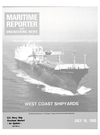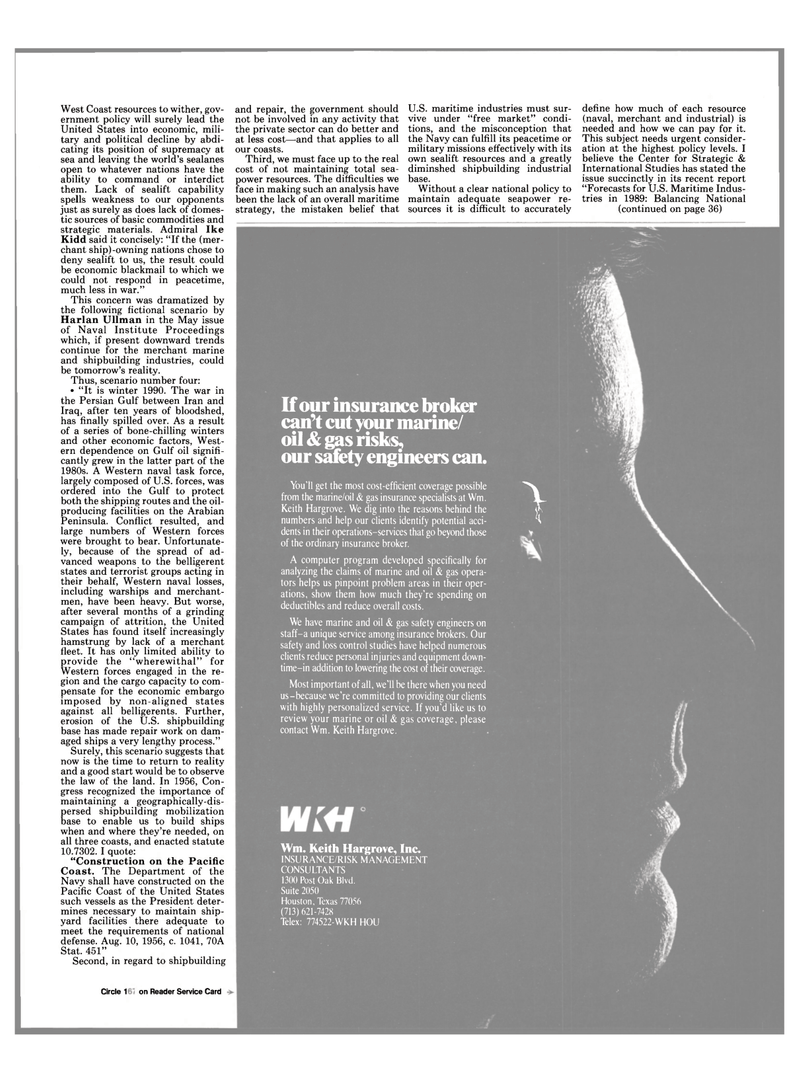
Page 35: of Maritime Reporter Magazine (May 16, 1985)
Read this page in Pdf, Flash or Html5 edition of May 16, 1985 Maritime Reporter Magazine
West Coast resources to wither, gov- ernment policy will surely lead the
United States into economic, mili- tary and political decline by abdi- cating its position of supremacy at sea and leaving the world's sealanes open to whatever nations have the ability to command or interdict them. Lack of sealift capability spells weakness to our opponents just as surely as does lack of domes- tic sources of basic commodities and strategic materials. Admiral Ike
Kidd said it concisely: "If the (mer- chant ship)-owning nations chose to deny sealift to us, the result could be economic blackmail to which we could not respond in peacetime, much less in war."
This concern was dramatized by the following fictional scenario by
Harlan Ullman in the May issue of Naval Institute Proceedings which, if present downward trends continue for the merchant marine and shipbuilding industries, could be tomorrow's reality.
Thus, scenario number four: • "It is winter 1990. The war in the Persian Gulf between Iran and
Iraq, after ten years of bloodshed, has finally spilled over. As a result of a series of bone-chilling winters and other economic factors, West- ern dependence on Gulf oil signifi- cantly grew in the latter part of the 1980s. A Western naval task force, largely composed of U.S. forces, was ordered into the Gulf to protect both the shipping routes and the oil- producing facilities on the Arabian
Peninsula. Conflict resulted, and large numbers of Western forces were brought to bear. Unfortunate- ly, because of the spread of ad- vanced weapons to the belligerent states and terrorist groups acting in their behalf, Western naval losses, including warships and merchant- men, have been heavy. But worse, after several months of a grinding campaign of attrition, the United
States has found itself increasingly hamstrung by lack of a merchant fleet. It has only limited ability to provide the "wherewithal" for
Western forces engaged in the re- gion and the cargo capacity to com- pensate for the economic embargo imposed by non-aligned states against all belligerents. Further, erosion of the U.S. shipbuilding base has made repair work on dam- aged ships a very lengthy process."
Surely, this scenario suggests that now is the time to return to reality and a good start would be to observe the law of the land. In 1956, Con- gress recognized the importance of maintaining a geographically-dis- persed shipbuilding mobilization base to enable us to build ships when and where they're needed, on all three coasts, and enacted statute 10.7302. I quote: "Construction on the Pacific
Coast. The Department of the
Navy shall have constructed on the
Pacific Coast of the United States such vessels as the President deter- mines necessary to maintain ship- yard facilities there adequate to meet the requirements of national defense. Aug. 10, 1956, c. 1041, 70A
Stat. 451"
Second, in regard to shipbuilding and repair, the government should not be involved in any activity that the private sector can do better and at less cost—and that applies to all our coasts.
Third, we must face up to the real cost of not maintaining total sea- power resources. The difficulties we face in making such an analysis have been the lack of an overall maritime strategy, the mistaken belief that
U.S. maritime industries must sur- vive under "free market" condi- tions, and the misconception that the Navy can fulfill its peacetime or military missions effectively with its own sealift resources and a greatly diminshed shipbuilding industrial base.
Without a clear national policy to maintain adequate seapower re- sources it is difficult to accurately define how much of each resource (naval, merchant and industrial) is needed and how we can pay for it.
This subject needs urgent consider- ation at the highest policy levels. I believe the Center for Strategic &
International Studies has stated the issue succinctly in its recent report "Forecasts for U.S. Maritime Indus- tries in 1989: Balancing National (continued on page 36)
Circle 313 on Reader Service Card
If our insurance broker can't cut your marine/ oil & gas risks, our safety engineers can.
You'll get the most cost-efficient coverage possible from the marine/oil & gas insurance specialists at Wm.
Keith Hargrove. We dig into the reasons behind the numbers and help our clients identify potential acci- dents in their operations-services that go beyond those of the ordinary insurance broker.
A computer program developed specifically for analyzing the claims of marine and oil & gas opera- tors helps us pinpoint problem areas in their oper- ations, show them how much they're spending on deductibles and reduce overall costs.
We have marine and oil & gas safety engineers on staff-a unique service among insurance brokers. Our safety and loss control studies have helped numerous clients reduce personal injuries and equipment down- time-in addition to lowering the cost of their coverage.
Most important of all, we'll be there when you need us-because we're committed to providing our clients with highly personalized service. If you'd like us to review your marine or oil & gas coverage, please contact Wm. Keith Hargrove. >
Wm. Keith Hargrove, Inc.
INSURANCE/RISK MANAGEMENT
CONSULTANTS 1300 Post Oak Blvd.
Suite 2050
Houston, Texas 77056 (713) 621-7428
Telex: 774522-WKH HOU

 34
34

 36
36
